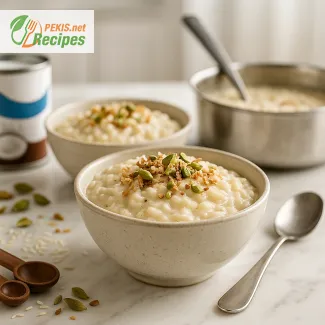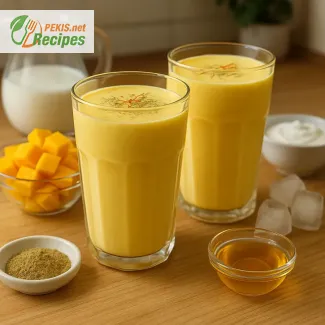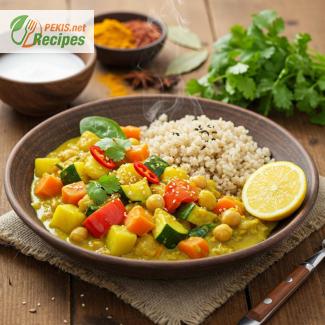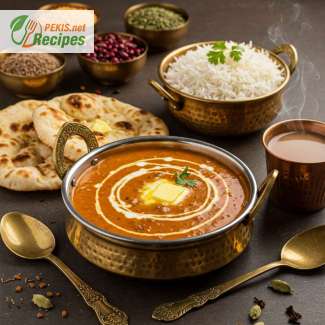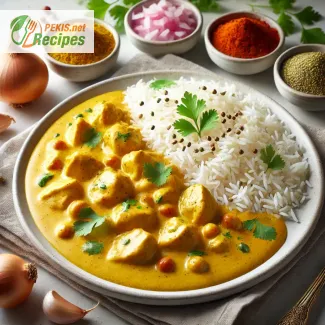
Creamy Chicken Curry with Rice is a true embodiment of comfort and elegance, blending rich, aromatic spices with tender pieces of chicken in a velvety, creamy sauce that drapes each grain of perfectly cooked rice. This dish encapsulates the essence of traditional curries while offering a sophisticated, smooth texture that’s irresistibly inviting. Designed to be a soul-satisfying meal, this chicken curry appeals to a wide variety of palates, making it a fantastic choice for family dinners, gatherings with friends, or even intimate occasions that call for something truly special.
The Art of Flavor
The base of the curry begins with a fragrant mixture of onions, garlic, and ginger, releasing a bouquet of warm spices like cumin, coriander, and turmeric. These spices are carefully balanced with creamy coconut milk or thick cream, creating a sauce that’s both silky and indulgent. The addition of garam masala toward the end of cooking infuses the dish with a warmth that lingers, elevating every mouthful. The juicy, succulent chicken pieces soak up these flavors, becoming an integral part of the sauce’s richness.
Serving Perfection with Rice
Paired with a bed of fluffy, fragrant rice, this creamy chicken curry is all about balance. The rice serves as a neutral canvas, absorbing the curry’s sauce and creating a harmonious blend of textures and flavors. Basmati rice is often the preferred choice for its light, aromatic grains that complement the curry, but jasmine or plain white rice can also work beautifully. For an extra touch, garnish the dish with fresh cilantro leaves or a sprinkle of toasted almonds, adding color and a hint of crunch.
Preparing in Advance
One of the most convenient aspects of Creamy Chicken Curry is its ability to be prepared in advance without losing any of its delicious qualities. You can prepare the curry up to 48 hours in advance and store it in the refrigerator. When preparing ahead of time, make sure to let the curry cool completely before transferring it to an airtight container. Preparing the curry in advance often enhances the flavors, as the spices have more time to meld and infuse into the sauce and chicken. If serving the dish for a special occasion, consider making it the day before to allow for this flavor development.
Serving Tips
When it’s time to serve, gently reheat the curry over low to medium heat, stirring occasionally to ensure it warms evenly and maintains its creamy consistency. Avoid boiling, as this can cause the cream to separate. Serve the curry with freshly prepared rice to enjoy the best balance of textures. Consider providing a small side of yogurt or raita to help balance the spices and provide a refreshing contrast. Fresh naan bread or chapati also pair wonderfully with the creamy curry, perfect for mopping up every last bit of sauce.
Storage and Leftover Recommendations
Storing creamy chicken curry is simple and practical. Once cooled, store any leftovers in an airtight container in the refrigerator, where it will keep well for up to 3 days. If freezing, portion the curry into individual servings in freezer-safe containers, where it will stay fresh for up to 3 months. To reheat from frozen, thaw the curry in the refrigerator overnight and warm it on the stovetop for best results. Avoid microwaving, as this can alter the texture and flavor of the creamy sauce.
Creamy Chicken Curry with Rice is a dish that not only offers an unforgettable combination of flavors but also the convenience of easy preparation in advance and versatile storage options. This flavorful, creamy curry brings together rich spices, tender chicken, and the perfect base of rice, delivering a comforting yet sophisticated dining experience every time.
- Prepare the Rice:
- Rinse the basmati rice thoroughly under cold water to remove excess starch.
- In a pot, bring 400 ml water to a boil with ½ teaspoon salt. Add the rinsed rice, cover, and simmer on low heat for 15-20 minutes until rice is tender and water is absorbed. Set aside and keep warm.
- Prepare the Curry Base:
- In a large skillet, heat 2 tablespoons oil over medium heat. Add the chopped onion and sauté for 5 minutes until it softens and turns golden.
- Add minced garlic and grated ginger. Sauté for 1-2 minutes until fragrant, being careful not to burn the garlic.
- Add the Spices:
- Stir in the curry powder, ground cumin, ground coriander, and turmeric. Cook for 1 minute to allow the spices to release their flavors.
- Cook the Chicken:
- Add the chicken pieces to the skillet. Season with salt and pepper. Cook for 5-7 minutes, stirring frequently until the chicken is no longer pink on the outside.
- Add the Tomatoes and Simmer:
- Add chopped tomatoes or tomato puree. Cook for another 5 minutes, allowing the tomatoes to soften and blend into the sauce.
- Pour in the Coconut Milk or Cream:
- Pour in the coconut milk (or cream for a creamier version) and stir to combine. Bring the mixture to a gentle simmer, reduce the heat to low, and let it cook for 15-20 minutes, stirring occasionally, until the chicken is cooked through and the sauce thickens.
- Finish with Garam Masala:
- Sprinkle garam masala over the curry, stir, and cook for an additional 2 minutes. Adjust the seasoning with more salt and pepper if necessary.
- Serve:
- Plate the curry over the basmati rice and garnish with freshly chopped coriander leaves if desired.
Storage Recommendations
- Refrigeration: Store leftovers in an airtight container in the refrigerator for up to 3 days. Reheat gently on the stovetop to prevent the sauce from curdling.
- Freezing: Portion the curry (without rice) into freezer-safe containers, where it will keep well for up to 3 months. To serve, thaw overnight in the refrigerator and reheat on low until warmed through.
The Creamy Chicken Curry with Rice recipe is both delicious and nourishing, offering a balanced meal that combines proteins, healthy fats, and complex carbohydrates. Each component in this dish contributes specific nutritional benefits that support various bodily functions and overall health. Let’s explore how the ingredients and nutritional values influence our body, focusing on the vitamins, minerals, and other key nutrients.
Key Nutritional Components and Their Health Impacts
- Chicken:
- As a lean protein source, chicken is crucial for building and repairing tissues. It’s particularly high in B vitamins such as niacin (B3) and B6, essential for energy metabolism and maintaining a healthy nervous system.
- Niacin also aids in reducing cholesterol levels, while vitamin B6 supports brain health and helps in the production of serotonin, a mood-regulating neurotransmitter.
- Additionally, chicken is a good source of phosphorus, a mineral important for strong bones and teeth, as well as selenium, which supports the immune system and acts as an antioxidant, protecting cells from oxidative stress.
- Coconut Milk (or Cream):
- Coconut milk contains healthy fats, especially medium-chain triglycerides (MCTs), which are metabolized differently from other fats. MCTs provide a quick source of energy and can promote satiety, which may assist in weight management.
- Coconut milk is also rich in magnesium and potassium, which support muscle function, cardiovascular health, and electrolyte balance.
- Lauric acid, a fatty acid in coconut milk, has antimicrobial properties that can benefit gut health by balancing the microbiome.
- If cream is used, it brings additional calcium and vitamin D (in fortified versions), which are crucial for bone health and immune function.
- Onions, Garlic, and Ginger:
- These ingredients serve as the foundation for the curry, each bringing unique health benefits. Onions are high in vitamin C, B6, and folate, which support immune health and cellular function.
- Garlic contains allicin, a compound known for its antimicrobial and anti-inflammatory properties, which can support heart health by reducing blood pressure and cholesterol levels.
- Ginger is widely known for its anti-inflammatory and digestive benefits, as well as for easing nausea and improving digestion. Rich in antioxidants, ginger protects cells from damage and supports overall immunity.
- Spices:
- Turmeric: Known for curcumin, its primary active compound, turmeric has strong anti-inflammatory and antioxidant properties. Curcumin may help reduce the risk of chronic diseases and alleviate joint inflammation.
- Cumin and Coriander: These spices aid digestion and are rich in iron and antioxidants. Iron supports red blood cell formation and energy production, which is essential for overall vitality.
- Garam Masala: This spice blend typically includes cinnamon, cloves, and cardamom, each with anti-inflammatory properties. Cinnamon, for example, helps regulate blood sugar levels, while cloves provide manganese, vital for bone health and metabolism.
- Rice:
- Basmati rice is a complex carbohydrate that provides sustained energy and dietary fiber, promoting digestive health. It is also a good source of B vitamins (especially thiamin and niacin), which support energy metabolism.
- Additionally, rice is a low-fat food, making it an excellent base that complements the richer, creamier curry without adding excess calories.
Vitamins and Minerals to Highlight
- Vitamin B6 (chicken): Supports cognitive function, immunity, and mood regulation.
- Vitamin C (onion): Boosts immunity, skin health, and acts as an antioxidant.
- Vitamin B3 (Niacin) (chicken): Promotes cardiovascular health and energy production.
- Vitamin D (if using fortified cream): Enhances calcium absorption and supports immune health.
- Iron (cumin, coriander): Essential for oxygen transport and energy levels.
- Calcium (cream, optional): Important for bone health and nerve signaling.
- Potassium (coconut milk, ginger): Helps manage blood pressure and fluid balance.
- Selenium (chicken): An antioxidant that supports immune function and thyroid health.
- Magnesium (coconut milk): Supports muscle relaxation, heart health, and energy production.
Frequency of Including This Dish in Your Diet
Creamy Chicken Curry with Rice is nutritious but also relatively rich due to the fats in coconut milk or cream. Ideally, incorporating this meal once every 1-2 weeks into your diet would allow you to enjoy its benefits without overloading on saturated fats. For those aiming to maintain a balanced diet, consider pairing this meal with lighter, vegetable-based dishes on other days. The high protein and moderate carbohydrate content make it suitable for active individuals or as a post-exercise meal when energy and protein requirements are elevated.
If you’re following a lower-fat diet, consider making this dish occasionally or modifying the recipe to use a lighter coconut milk or replace cream with Greek yogurt.
General Advice and Tips for the Recipe
- Adjusting Spice Levels:
- This recipe can be customized to suit different spice tolerance levels. For a milder curry, reduce the amount of chili or curry powder. For a spicier kick, add a pinch of chili flakes or fresh green chili slices.
- Healthier Modifications:
- Reduce Saturated Fat: Use light coconut milk instead of full-fat coconut milk or cream to reduce calories and saturated fat without sacrificing too much flavor.
- Add More Vegetables: Consider adding spinach, bell peppers, or zucchini to increase the fiber, vitamins, and minerals in this dish.
- Swap for Brown Rice: To increase fiber and micronutrient content, serve the curry with brown basmati rice instead of white rice.
- Pre-Preparation and Meal Planning:
- Make in Bulk: This curry can be made in larger batches and stored in the freezer. This makes it an ideal dish for meal prep, as the flavors improve over time.
- Versatile Protein Options: Swap out the chicken for tofu or chickpeas for a plant-based version. These alternatives maintain protein content and are rich in fiber, making the dish suitable for vegetarian or vegan diets.
- Balanced Meal Addition:
- Serve with a side of steamed vegetables like broccoli or carrots to add more fiber and keep the meal balanced. For additional freshness, garnish with fresh cilantro or add a spoonful of plain yogurt on the side to add a cool contrast to the warm spices.
- Storage Tips:
- Refrigerate leftovers in an airtight container for up to 3 days. When reheating, gently warm on the stovetop to prevent the sauce from splitting.
- Freeze in portions for up to 3 months. Thaw in the refrigerator before reheating for the best texture and flavor.
Incorporating Creamy Chicken Curry with Rice into your diet brings together the benefits of high-quality proteins, essential vitamins, and aromatic spices, making it both a delightful and beneficial addition to your meal rotation. Enjoy it as part of a balanced diet and savor the flavors of this comforting, nutrient-dense meal.
- Contains: Dairy (if using cream), coconut (if using coconut milk)
- May Contain: Garlic (for those with allium allergies)
Substitutions to Remove Allergens
- Dairy-Free Option: Use coconut milk instead of cream for a lactose-free, creamy consistency.
- Allium-Free Option: Substitute garlic and onion powder with asafoetida (hing) in small quantities for a similar depth without alliums.
